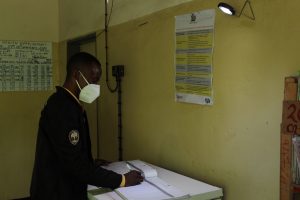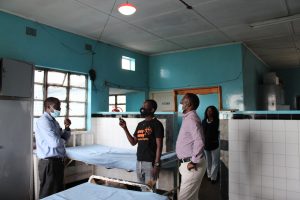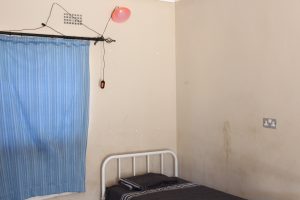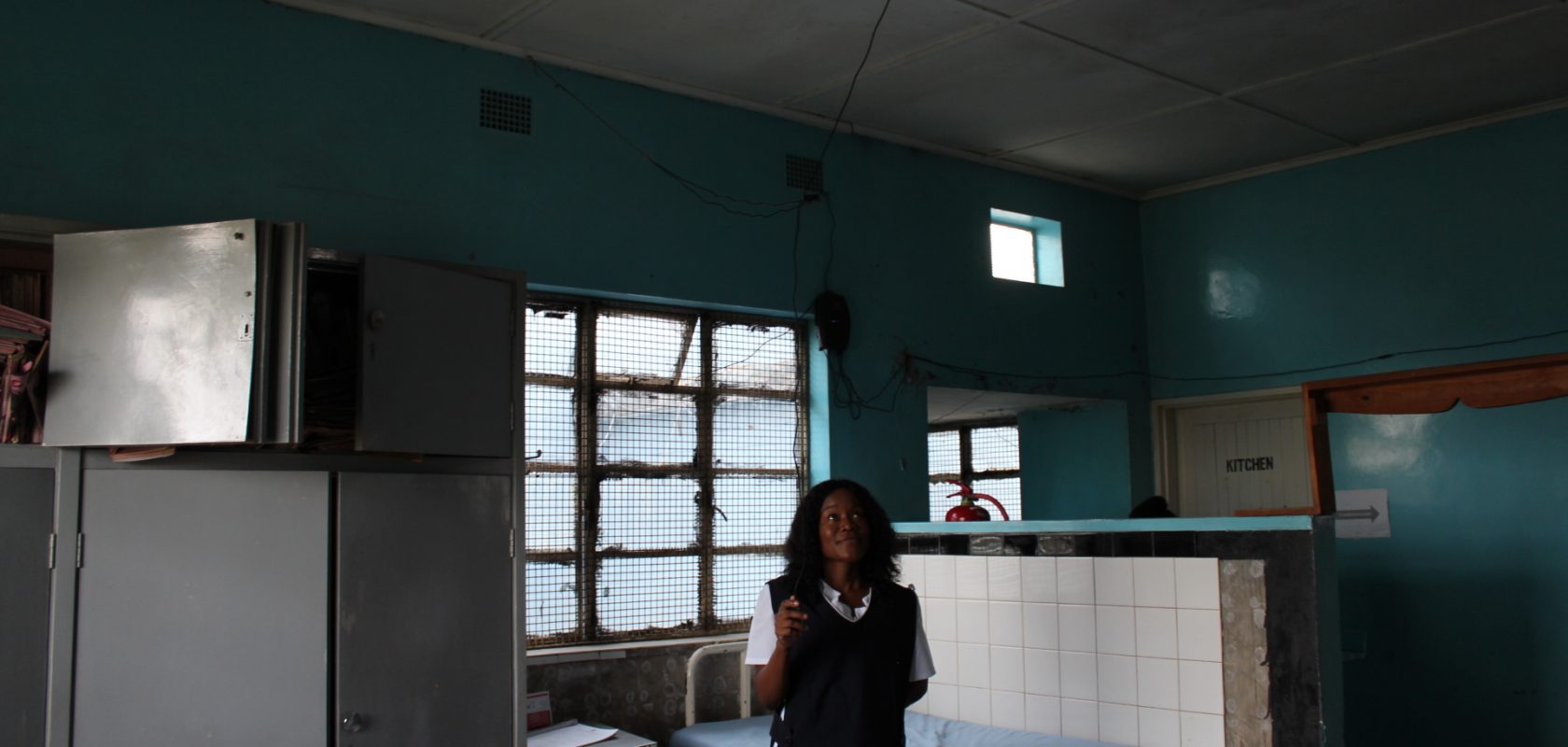“It was not easy before, we used to use phones to screen patients in the out-patient department, now all the rooms are well lit making it easy,” Keith Samanata, Community Health Assistant of Miputu Health Post, Masaiti District.
One year later, we visited these clinics to see how the solar systems were working and impacting the communities.
“The solar lights provided have made my work easy, now when I have a patient I do not need to take them to the maternity ward to screen. I can easily screen and treat the patient in the out-patient department,” Keith Samanata, Community Health Assistant of Miputu Health Post, Masaiti District.

Keith Samanata, Community Health Assistant of Miputu Health Post, Masaiti District
It was a cold and windy day in May when the team set off towards the Copperbelt Province in Ndola District. As often is the case with field work, things take longer than expected and we were already running behind schedule when we finally set off. As a Monitoring and Evaluation Consultant, I joined to speak to the health professionals on the ground, to listen to their experience and to get their view on the solar products that had been delivered a few months earlier, in the midst of the Covid-19 pandemic.
According to Power Africa, lack of reliable power in health facilities undermines the quality of healthcare for millions of people, especially in sub-Saharan Africa, where nearly 60 percent of all health centres do not have access to electricity. Of those that do, only 34 percent of hospitals and 28 percent of health clinics have reliable access[1].
The Covid-19 pandemic, which has had a gloomy and negative impact on the world, has shown even further how vulnerable, underdeveloped, and ill prepared health systems are, especially in the rural areas in Zambia. It became apparent that a great number of refrigerators used in rural health clinics in Zambia are not powered by reliable electricity, which is required to safely store vaccines and medicines.
At Copperbelt Provincial Medical Office, we were warmly welcomed by Dr. Charles Sakulanda, Public Health Specialist, who expressed gratitude on behalf of the province for having received the solar lights the previous year, however, there is still a big need. “There are facilities in need that have not received solar lights, as the lights distributed within the current project were segmented to high priority health clinics,” said Dr. Sakulanda.

Three men at Chibola RHC speaking about the solar light
As we continued on our way through the Copperbelt Province, we needed to fill up on diesel as there was fuel shortage across the country at the time. This is yet another struggle for rural health clinics. Some larger facilities may have access to a generator for power, but often, they are left without any fuel. Luck was on our side at the fifth filling station but by this time, we were behind schedule again.
Travelling in the field often comes with a set of challenges. If it is not the lack of petrol, it can be difficult roads or technology failing. It’s important to be very prepared. On this trip, I was particularly unfortunate.
At Mufulira District Health Office – I dropped my mobile phone in a tank of water. I boldly placed my hand in the tank and retrieved my phone – I was gutted. I told our driver about it and he assured me that he had a plan.
On our way to Mukuba B Health Post we got lost and were given varying directions from the community members. We used two different routes and still couldn’t find our way. It was when we used the third route provided by a group of ladies having a drink called chibuku at the local tavern, that we were able to find our way. The ladies were cheerful yet mildly persistent in their request for solar lights. Nevertheless, very helpful as we finally found our way in under thirty minutes.
As soon as we arrived, Sam, our driver, helped me put my phone towards the sunlight to dry, he assured me that everything would be alright.
We started our clinic interview and as we were winding down, I had my third mishap. The SD card on my camera had failed, all my pictures from the previous day were gone, and I learnt a very painful field lesson. Always back up photos every night, no matter how tired you are from travelling. It is not worth the risk.
The silver lining in all of this was meeting seven-month-old baby Monica. She had great weight, healthy chubby, just how I love babies, the softest skin, a head full of thick black hair and the most trusting hands as she grabbed me. Her mother was weak and had to be attended to during our interviews, to which we always respect, a patient’s health is paramount. The medical staff were limited and Monica’s mother needed to be assessed and then provided with injections.
Women delivering in rural health clinics are susceptible to death during childbirth and complications as a result of procedures being conducted in the dark. Many women are asked to bring their own candles to the clinic.

Maternity Ward at Kamifungo RHC with a solar light above the bed
The staff expressed appreciation of the solar lights as they are now able to work without requiring the help of a colleague to hold a mobile phone whilst they are conducting medical procedures. With access to solar lights, their work has truly been made easier. Community members and patients have expressed relief upon observing the solar lights, as it was a financial strain on patients and expecting mothers to purchase torches or candles before arriving at the clinic, bearing in mind the current economic hardships being experienced by all.
As the sun was setting, we were winding down our work at the rural health clinic. It gave me a comforting feeling to know and see that the medical professionals who previously did not have solar lighting would work better tonight and the nights to come because of our work.
“We mostly rely on the solar lights provided by SolarAid for the night shift,” said Tiwonge Miti at Chibolya Clinic.
I took baby Monica for a walk. She smiled and looked at me curiously as I spoke to her. She didn’t cry or fuss, in fact she calmed me down. It was right in that moment that I was reminded of the work that we do and the impact it has on people. It is the simple things. Even though travelling in the field can be difficult and exhausting, it’s always worth it in the end.
I forgot to mention, our driver, Sam was right, my phone worked just fine the next day after a good dry, with the power of the sun.
No health clinic should be left in the dark. SolarAid aims to power rural clinics, so that patients are treated safely. Learn more about our work to bring clean power to rural health clinics here.
________________________________________________________________________________________________
[1] https://www.seforall.org/news/health-facility-electrification-in-sub-saharan-africa
